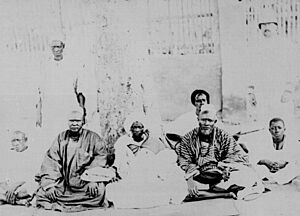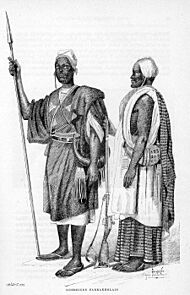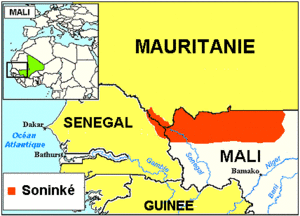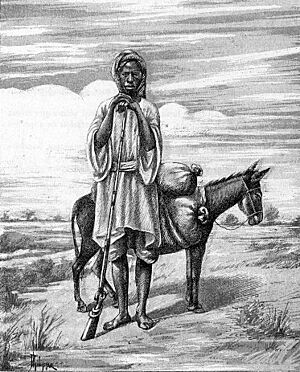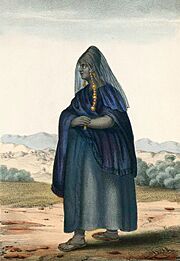Soninke people facts for kids
| Sarakolléh / Aswanik | |
|---|---|
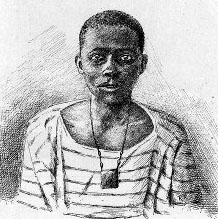
A Portrait of a Soninke man (1890)
|
|
| Total population | |
| Over 2.0 million | |
| Regions with significant populations | |
| 2,124,000 (9.8%) | |
| 225,154 (1.4%) | |
| 142,606 (8.2%) | |
| Languages | |
| Soninke, French | |
| Religion | |
| Predominantly Sunni Islam | |
| Related ethnic groups | |
| Yalunka people | |
The Soninke people are a group of people in West Africa who speak a language called Soninke language. This language is part of the Mande language family. You can find Soninke people in countries like Mali, southern Mauritania, eastern Senegal, The Gambia, and Guinea.
The Soninke people were the founders of a very old and powerful kingdom called the Ghana Empire (also known as Wagadou). This empire existed from about 200 CE to 1240 CE. When the Ghana Empire ended, many Soninke people moved to different places. They spread across West Africa, including Mali, Mauritania, Senegal, and even as far as Nigeria. Because they were known for trading, some people called them Wangara. There's even a saying in Senegal that means "when Americans landed on the moon, a Soninke was already there," showing how widely they traveled for trade!
Most Soninke people are Muslims. They were one of the first groups in West Africa to become Muslim, around the 10th century. Today, there are over 2 million Soninke people. Their customs and traditions are quite similar to other Mandé groups in the region. These traditions include Islamic marriage ceremonies and other social practices.
Contents
What's in a Name?
The Soninke people are known by many different names. These names include Aswanik, Dafing, Maraka, Sarakolleh, and Wangara.
They call themselves "Soninké." However, other groups have different names for them. For example, the Wolof people call them "Sarakholés," and the Bambara people call them "Marakas." The Mandinka people use the name "Wangara," and the Hausa people say "Wangarawa." In Mali, they are often called "Marka."
The name "Serakhulle" has been used for the Soninke since at least the 16th century. It's used by people in places like The Gambia and Hausaland. Sometimes, the name "Soninke" has been used in a negative way in some areas, which is why "Serakhulle" is often more common.
A Look at Soninke History
Old discoveries show that the areas where Soninke people live today have been settled for a very long time. Stone buildings found in places like Tichit-Walata in Mauritania suggest people lived there between 2500 BCE and 600 BCE. While we don't know exactly who these early people were, they were likely related to the Soninke and other Mande groups. They had a strong farming and animal-raising society in those ancient times.
According to Soninke oral traditions (stories passed down through generations), their ancestor was a person named Dinga. His son, Dyabe Sisse, is said to have founded the Wagadu kingdom, with its capital city at Kumbi. Another story says they came from Aswan in ancient Egypt. However, most experts believe these stories about foreign origins came later, after the Soninke became Muslim. Evidence from old sites suggests the Ghana Empire grew from local Soninke cultures, not from outside regions.
The first written records about the Soninke come from early Islamic historians. These records tell us that the Soninke founded the ancient Ghana Empire. This empire started around the 1st to 3rd centuries CE. It was a powerful empire until it began to decline around the 10th century and was destroyed by the 12th century.
Where Soninke People Live Today
Today, there are more than 2 million Soninke people. They live all over West Africa. Many also live in France because of past migrations when Senegal and Mali were part of the French colonial empire.
Most Soninke people live near the upper Senegal river and along the borders of Mali, Senegal, and Mauritania. During French colonial rule, many Soninke moved to cities like Dakar and other places in Africa and France. Soninke communities were among the first African groups to settle in France, especially in Paris and southern French cities. Their language is widely spoken among many Muslim communities in France. You can also find Soninke people in Central Africa, including descendants of traders from the 1800s.
Trading groups called Wangara helped spread Soninke people and their culture across much of Mali, Senegal, southern Mauritania, and parts of Burkina Faso, The Gambia, and Guinea-Bissau. Soninke merchant communities were very important for trade in West Africa, especially during the time of the Bambara Empire.
Soninke Religion
The Soninke people were important traders who connected the Berber people of North Africa with other empires in West Africa. They helped trade salt from the north for gold found further inland. This trade brought Muslim traders to them, especially Arab traders interested in gold, after Islam arrived in North Africa. Early writings from Arab geographers in the 8th and 11th centuries mention the Soninke people and their Ghana Empire.
The leaders and people of the Ghana Empire became Muslim in the 11th century. They have been Muslim ever since. Some Islamic sources suggest this conversion happened after the Almoravid conquest of the Ghana Empire in 1076. Like other Mande peoples, the Soninke usually follow the Maliki school of Sunni Islam.
Society and Culture
Soninke society and culture share many practices with their neighboring groups, especially other Mande peoples. This includes their religion (Islam), jobs, foods, important life events, family structures, weddings, and how their society is organized.
How Soninke Society is Organized
Soninke society, like other Mande groups, has different social levels.
Historically, Soninke society had a group of free people called Horro. There were also different groups of skilled workers, like a caste system, called Namaxala. At the bottom were slaves, called Komo. In some Soninke groups, there was also a noble class called Tunkanlenmu. Soninke society became more organized into these levels after the 13th century.
Slaves were a large part of the population, sometimes making up half of it. They were organized into three main types: village slaves, domestic slaves (who lived with families), and trade slaves (who could be bought and sold). Over time, people in these groups usually married only within their own group.
Above the slaves were the castes. These were also groups passed down through families, and people usually married within their caste. Examples include leather workers (garanke), storytellers and musicians (fune or jeli), and metalworkers or potters (tage or numu).
These social levels and the system of slavery grew as trade became more complex in West Africa. Experts believe that the caste system developed around the same time as slavery became more common, possibly as early as the 10th century.
Marriage Customs
Marriage in Soninke society follows Islamic traditions. It's common and often preferred for cousins to marry, similar to the Fula people. Parents usually agree to the marriage. There's a saying that "Cousins are made for each other." Some believe that cousin marriages help keep money and wealth within the family.
If both families agree, the couple becomes engaged in a mosque. After the engagement, the man gives money or gifts to the woman's family each month to help with their expenses. The marriage itself is called futtu. It includes a marriage contract that mentions the gifts, and there's a wedding celebration called karikompe.
After marriage, the new couple has advisors. The man's advisor is called the khoussoumanta-yougo, and the woman's is called khoussoumanta-yakhare. After a week of celebrations, women gather to show the gifts the couple received, especially from the woman's mother.
Historically, marrying someone from a different social level or caste was not common. However, in noble families where a man had more than one wife, he might sometimes marry a woman from a lower social group.
Soninke Foods
For breakfast, Soninke people often eat fonde, which is a porridge made from millet, sugar, milk, and salt. Another breakfast food is sombi, a porridge made from rice, millet, or corn. For lunch, demba tere and takhaya are very popular. Both of these dishes use rice and peanuts, which are common ingredients in Soninke cooking. Dere is a stew made from millet and beans.
Soninke Economy
Traditionally, Soninke people are involved in both trade and farming. During the rainy season, both men and women work in the fields. However, women often stay home to cook and care for their children. They also do other tasks, like dyeing cotton fabric.
Many of the first West African immigrants to France were from the Soninke group. The Soninke are an important group in The Gambia, Senegal, and Mali.
Famous Soninke People
- Doussou Bagayoko, a musician from Mali
- Mamadou Bagayoko, a footballer from Mali
- Siaka Bagayoko, a footballer from Mali
- Abdoulaye Bathily, a historian and politician from Senegal
- Djegui Bathily, a Judoka (judo athlete) from Senegal
- Lassana Bathily, a Malian who helped people during a crisis in France
- Germain Berthé, a footballer from Mali
- Ousmane Berthé, a footballer from Mali
- Hassoun Camara, a footballer from France
- Khassa Camara, a footballer from Mauritania
- Soninke Camara, a musician from Mali
- Zoumana Camara, a footballer from France
- Kaya Magan Cissé, a historical figure
- Papiss Cissé, a footballer from Senegal
- Lassana Hawa Cissokho, a musician from Mali
- Moussa Diagana, a writer from Mauritania
- Ismaël Diakité, a footballer from Mauritania
- Souleymane Diamouténé, a footballer from Mali
- Fousseni Diawara, a footballer from Mali
- Diaby Doua, a musician from Mali
- Boubacari Doucouré, a footballer from France
- Cheick Doucouré, a footballer from Mali
- Kamory Doumbia, a footballer from Mali
- Moussa Doumbia, a footballer from Mali
- Boukary Dramé, a footballer from Senegal
- Chéché Dramé, a musician from Mali
- Mamadou Lamine Dramé, a 19th-century leader who fought against French colonization
- Demba Ganda Fadiga, a musician from Mali
- Diadia Fadiga, a musician from Mali
- Ganda Fadiga, a griot (storyteller/musician) from Mali
- Khalilou Fadiga, a footballer from Senegal
- Babou Fofana, a footballer from Mali
- Gueïda Fofana, a footballer from France
- Guessouma Fofana, a footballer from Mauritania
- Lamine Gassama, a footballer from Senegal
- Mamoudou Gassama, a Malian who became famous for a heroic rescue in France
- Omaré Gassama, a footballer from Mauritania
- Omar Gassama, a politician from The Gambia
- Sadio Gassama, a politician from Mali
- Bingourou Kamara, a footballer from Senegal
- Frédéric Kanouté, a footballer from Mali
- Sadio Kanouté, a footballer from Mali
- N'Golo Kanté, a footballer from France
- Ibrahima Kébé, a visual artist from Senegal
- Babacar Khouma, a footballer from Senegal
- Sékou Koïta, a footballer from Mali
- Mademba Konté, a musician from Mali
- Yimbi Kumma, a rapper from Mali
- Linky LK, a rapper from Mali
- Mamadou Demba Magassa, a musician from Mali
- Mohamed Magassouba, a football coach from Mali
- Moussa Marega, a footballer from Mali
- Moussa Niakhaté, a footballer from Senegal
- Falaye Sacko, a footballer from Mali
- Lamine Sakho, a footballer from Senegal
- Harouna Samaké, a musician from Mali
- Issaka Samaké, a footballer from Mali
- Soumaila Samaké, a basketball player from Mali
- Yéah Samaké, an entrepreneur and politician from Mali
- Mamadou Samassa, a footballer from Mali
- Diadie Samassékou, a footballer from Mali
- Oumou Sangaré, a musician from Mali
- Younousse Sankharé, a footballer from Senegal
- Landing Savané, a politician from Senegal
- Sitapha Savané, a basketball player from Senegal
- Djibril Sidibé, a footballer from Mali
- Gabourey Sidibe, an actress from America
- Mahamadou Sidibé, a footballer from Mali
- Kaïdama Sidibé, a former Prime Minister of Mali
- Muhammed B. Sissoho, a TV and radio host from The Gambia
- Sidney Sokhona, a filmmaker from Mauritania
- Bintou Soumbounou, a musician from Mali
- Maimouna Soumbounou, a musician from Mali
- Fanta Souroukou, a musician from Mali
- Youssouf Sabaly, a footballer from Senegal
- Myriam Soumaré, a track and field athlete from France
- Yacouba Sylla, a footballer from Mali
- Abubacarr Tambadou, a former Minister of Justice of The Gambia
- Adama Tamboura, a footballer from Mali
- Aïce Tamoura, a musician from Mali
- Demba Tandia, a musician from Mali
- Mamadou Tandja, a former President of Niger
- Sidy Bonco Tangoudia, a musician from Mali
- Djelimady Tounkara, a musician from Mali
- Maakan Tounkara, a handball player from France
- Mamadou Tounkara, a footballer from Spain
- Bassala Touré, a footballer from Mali
- Halima Kissima Touré, a musician from Mali
- Balemé Kandji Traoré, a musician from Mali
- Molla Wagué, a footballer from Mali
- Moussa Wagué, a footballer from Senegal
- Moussa Sissako, a footballer
- Moustapha Soumaré, a diplomat and UN Special Representative
- Myriam Soumaré, a sprinter from France
See also
- Soninke language
 | Percy Lavon Julian |
 | Katherine Johnson |
 | George Washington Carver |
 | Annie Easley |


